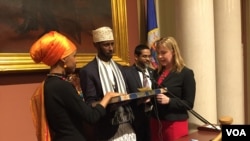Ilhan Omar made history this week when she began her term as the first Somali-American lawmaker in the United States.
Omar was sworn into the Minnesota House of Representatives on January 3, the opening day of its 90th legislative session.
Few people thought a campaign like Omar’s would be possible this election year. Muslim-Americans had been at the center of a strong political debate about immigration and terrorism.
A historic day for Muslim-Americans
Many supporters filled the Minnesota State Capitol for Omar’s first historic day. They were there to support Omar as she took her ceremonial oath of office.
Asad Zaman was one of the supporters present. He is the executive director of the Muslim American Society of Minnesota.
"The Muslim community needs a win…the ethos of America that can embrace a Somali-American, hijab-clad Muslim woman as their representative, I think that says something amazing about America."
An image of hope
Omar was born in 1982 in Somalia. But after a civil war began, she fled with her family to a refugee camp in Kenya. She immigrated to the United States in 1995.
As an adult, Omar worked on several legislative and city council campaigns. She later became the director of policy & initiatives for the Women Organizing Women Network in Minnesota.
Omar is now an image of hope for Muslims, and particularly Muslim women, around the world.
Nausheena Hussain is with an organization called Reviving the Islamic Sisterhood of Empowerment, or RISE. She spoke to the crowd of Omar supporters gathered at the state capitol building.
"We may not have shattered that glass ceiling in electing a president or head of state in our country, but for me, and the thousands of Muslim women, and women of color, Ilhan Omar is that ceiling that’s been shattered for us,” Hussain said.
A “glass ceiling” means a barrier, usually affecting women and minorities, to how far someone can grow in their profession.
America’s 2016 presidential election campaign included calls from some politicians to ban Muslim immigrants from entering the country.
However, Omar views her role in the national conversation about Muslim-Americans as a positive one.
"It sort of provides a counter narrative to say that all is not bad. That there is good, and if someone like Ilhan, who has all the odds against her, can succeed, then we are able to see that, as a country, we do have a balance of both good and bad and we just have to figure out a way to come together and make sure we are amplifying the voices of good."
Going outside the community for support
Ilhan Omar appealed to many different types of voters. She did not win a majority of the Somali-American votes in her district. More Somali-Americans voted for her opponent, Mohamud Noor. He is also from Somalia.
But Omar won more votes from people outside the Somali-American community. Asad Zaman explained that Omar practiced “inclusive politics.”
“She’s been able to put forth a candidacy that is attractive to a largely white liberal group of voters and she has convinced them that she is the best candidate."
Omar’s election is giving others outside of Minnesota hope that anything is possible.
"Hearing about young people who are running for elected office in Kenya and in Somalia because they were inspired by my race…I think messages like that … truly put things into focus.”
Omar says one of her biggest goals now is meeting the expectations and hopes people have for her, as she begins her work in Minnesota’s House of Representatives.
Zaman says that many people outside of Minnesota will be following Omar’s journey and progress.
“This is a big deal and I think the whole world is watching what we are doing here today."
I’m Phil Dierking.
This story was originally written for VOAnews.com by Kane Farabaugh. Phil Dierking adapted this story for Learning English. Ashley Thompson was the editor.
How do you think Ilhan Omar’s journey will inspire people? We want to hear from you. Write to us in the Comments Section or on our Facebook page.
_______________________________________________________________
Words in This Story
amplify – v. to increase the strength of
attractive – adj. having a pleasing appearance
counter narrative – n. an argument that disputes a commonly held belief or truth.
cycle – n. a repeating series of events or actions
focus – n. a subject that is being discussed or studied
glass ceiling – n. a barrier, usually affecting women and minorities, to how far someone can grow in their profession.
historic – adj. famous or important in history
hijab – n. a head covering worn in public by some Muslim women.
qualify – v. to have the necessary skill or knowledge to do a particular job or activity
shatter – v. to break suddenly into many small piece









